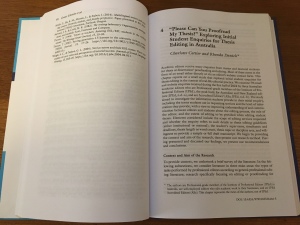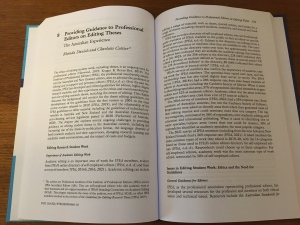Welcome to part 2 of my blog celebrating 10 years since I started my business Right with Rhonda in late 2013. Read part 1 here.
1. Reflections on my clients
I have enjoyed working with a diversity of clients over many years, including students and academics, and public sector clients. I have supported clients from editing their PhD thesis, to then editing their job applications, editing their journal articles, editing the theses of students they supervise, editing their students’ journal articles, editing research grant applications, and then editing their promotion applications. Some clients are well on the path from PhD student to Professor. Many of my clients are at top universities in Australia. Read my blog on university rankings and editing here.
2. Reflections on my work
It has been very satisfying to edit public reports and research on important issues in gender equality, health, education, transport, and diversity and inclusion. Some work has been publicly available, and some work is published in journals. I am maintaining confidentiality by not mentioning specific reports here, but I am named and acknowledged on some.
Most of my work is broadly in the social sciences, but sometimes there is something a little different – like archaeology, veterinary science or research in countries I am less familiar with like Mongolia. I enjoy contributing in my areas of knowledge including economic geography, urban planning and transport, using my experience as a published researcher.
Read my blog on getting published in Nature here.
3. Reflections on the changing nature of editing work
Over 10 years of business, I feel there has been a greater acceptance of a more relaxed approach to strict grammar and style rules. This is partly due to the delay in updating the Australian Government’s Style Manual, the emergence of other Australian style guides, the increase in short-form and informal communication such as texts and Twitter, and the variety of “Englishes” around the world. As always, the focus should be on clear communication for the purpose and audience.
Over 10 years, I have definitely seen better use of reference management software from students, but referencing still needs checking.
However, not every one takes advantage of all the useful style, structure and formatting features in Word when working on a long document. This is my number 1 tip for students – learn how to use Word early on. It saves time later on.
With research becoming increasingly complex, clear presentation is essential. It is so competitive to publish in the top academic journals that professional copy editing on all submissions, from the first to the final, is essential to avoid distracting errors and typos and get past gatekeeping journal editors. Some journals even require authors to organise and certify the copy editing. I have had an increase in clients in China, usually through Australian co-authors, as Chinese researchers also seek to publish in the top English language international journals.
4. Looking ahead
Looking ahead, I’m sure there will be more changes in editing. Even with the development of AI tools such as ChatGPT, there will always be a need for a careful and thoughtful professional editor with real-world commonsense.
As I noted in my blog in 2020, Celebrating 100 editing blogs and 7 years of Right with Rhonda, my blogs are based on issues which arise in my day to day work as a self-employed academic editor and as a professional member of the Institute of Professional Editors. Thanks to all my clients over the last 10 years for providing such interesting material to edit and making me think.
Read all my blogs here.
Contact me
To work with an accredited editor who has been successful for over 10 years striving for clear communication, please contact me at rhdaniels@bigpond.com



